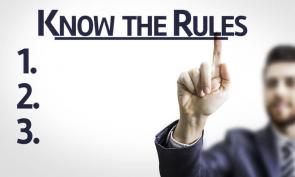
As 2003 begins, hundreds of lawyers are finding themselves with a new firm name on their business cards. Many others are finding themselves unemployed. While the worst is hopefully behind us, there are continued signs that lifelong employment is an ancient custom that went the way of the typewriter.
Twenty-five years ago if you managed your clients well and worked hard, partnership might be in your future. Today, the rules have changed. Instead of lifetime employment, most lawyers find themselves moving several times during their career.
Since the probability is high that you will make at least one lateral move during your career, you need to understand what it means to start over at a new firm. What follows are some thoughts to help you ease the transition.
Being Laid Off From A Large Firm
For those of you who are still involved in a job search, I offer the following words of encouragement. While this recession has caused you a lot of pain (and it may not seem clear right now when this pain will end), rest assured that this too will pass.
If you were let go from a prestigious law firm in Boston, do not forget how you got there in the first place. Even if you did not work for a top Boston firm, you made it through law school and you know how to work hard, how to compete and how to achieve.
Stop paying attention to the depressing headlines in the business section. Ignore the negativity that undoubtedly surrounds you. Do not dwell on broken promises or unhelpful comments like "What a lousy time to be looking for a job!" None of this will be particularly helpful to you.
Instead, focus your efforts on an aggressive job search and maintain a positive attitude in public (use friends and family to vent). You may have to make some interim moves along the way and compromise your short-term expectations (taking work on a project basis, lowering your salary expectations or joining a practice group that does not have the client mix that you prefer).
But in the end, you will succeed because you know how to succeed.
As a recruiter, I have seen many lawyers weather significant periods of unemployment. Many are happier in their new jobs than they were in their old jobs. So even if you do not have a new job to look forward to at the moment, at some point you will.
Read these survival tips and think about how you will reinvent yourself after you accept your new position
* A Fresh Start
Despite all of the uncertainty associated with starting over, there is something refreshing about starting a new job. No one knows your foibles and you have the chance to do things differently. But this requires a certain amount of self-reflection. Without taking the time to evaluate your prior experience, you are likely to fall into the same patterns.
Spend the time to think about what went right and what went wrong in your last job before diving into a new one. Did you manage your time well? Did you work effectively with support staff? Did you spend an appropriate amount of time on assignments? What kind of work do you like? What skills would you like to hone?
One way to reflect on your past experience is to ask your former colleagues for feedback. Did they think you were a good listener? Did you give good instructions and feedback on assignments? Did you keep partners well informed about work they passed on to you? Were you patient enough? Were you thorough?
While this may be a difficult thing for you to do if you have just been laid off, sometimes you can get valuable information from a past employer that can help you in your next job. Approach people who you feel comfortable with. Do not argue with them. Just get the facts. You can always decide later what you should pay attention to and what you can discount.
The bottom line is that it is important to understand if anything other than economics played a role in your demise.
* A Fresh Start
Identifying what you want to work on in your new role is only half the battle. Old habits are difficult to change. If you really want to change, you need to commit to change in a way that will hold you accountable.
Try writing some goals down on paper. Consider hiring a coach. Commit to getting some mentoring from a more experienced attorney. Most New Year's resolutions are broken long before the end of the year because change is difficult. You have to work at change. Find ways to ensure that change is likely to occur.
* Let The World Know About Your New Position
Your new firm will want to publicize your move. If you are asked to provide a list of contacts so that the firm can send out announcements, cast your net wide. Include former colleagues, clients, prospective clients, law school classmates and anyone who was helpful to you in your job search.
Take the time to thank everyone who met with you or spoke with you during your search. Tell them what is exciting about your new position and ask if there is any way that you can be of help to them. This kind of follow-through takes minimal effort, but many lawyers fail to do this.
* Get To Know Your New Co-Workers
Doing great work is important to your success at your new firm. But developing relationships at your new firm is critical. You can learn some of the unwritten rules by observing your new colleagues; but you can accelerate the learning process by taking the time to talk to secretaries, paralegals, associates and partners about how things are done.
Take the time to meet with your subordinates, colleagues and superiors individually. Listen to what they have to say. Ask questions about the work they do, about their work style, and find out what you can do to make their lives easier.
Educate them about your work style. How do you like work to be done? How much feedback do you want before you see the final product?
Build relationships in all directions in your new firm and resist the temptation to build early alliances. If you are the kind of person who likes to have trusting relationships at work, let those relationships build slowly. The last thing you want to do is to find yourself allied with a partner who everyone tries to avoid.
* First Impressions Are Critical
Work extra hard during the honeymoon period. Remember the importance of first impressions and try to say "yes" as often as you can in the first few months. Earn the right to say "no" by saying "yes."
In some ways, this may feel like taking a step backwards in your career. In your old firm, you already knew when it was okay to say "no." But this is a new group of professionals who are trying to decide if you are someone they can depend on and trust. If you say "no" before you have established some good will, it will be that much more difficult to gain the trust of this partner in the future.
* Some Notes For Lateral Partners
If you are joining a new firm as a partner, you still need to be concerned with the issues outlined above. But as a partner, there is the added complexity of bringing clients to the new firm.
Partners who are new to a firm need to quickly demonstrate that they are members of the "team." If you are a partner who is bringing a practice with you, you need to service your own clients. But it is equally important to demonstrate your willingness to do work for other partners and make sure that you are giving some work to others.
By broadening your focus beyond doing legal work for your own clientele and by cross-marketing the firm's services to your clients, you will show your commitment to the new firm and enhance your chances for success.
Conclusion
No one likes to be the new kid on the block; but the old career paradigm is gone, and at some point it is likely that you will have to start all over. If you take the time to invest in your new home and work on building relationships, your likelihood of moving again will decrease and your chances for a successful transition will be much greater.
About Harrison Barnes
Harrison Barnes is a prominent figure in the legal placement industry, known for his expertise in attorney placements and his extensive knowledge of the legal profession.
With over 25 years of experience, he has established himself as a leading voice in the field and has helped thousands of lawyers and law students find their ideal career paths.
Barnes is a former federal law clerk and associate at Quinn Emanuel and a graduate of the University of Chicago College and the University of Virginia Law School. He was a Rhodes Scholar Finalist at the University of Chicago and a member of the University of Virginia Law Review. Early in his legal career, he enrolled in Stanford Business School but dropped out because he missed legal recruiting too much.
Barnes' approach to the legal industry is rooted in his commitment to helping lawyers achieve their full potential. He believes that the key to success in the legal profession is to be proactive, persistent, and disciplined in one's approach to work and life. He encourages lawyers to take ownership of their careers and to focus on developing their skills and expertise in a way that aligns with their passions and interests.
One of how Barnes provides support to lawyers is through his writing. On his blog, HarrisonBarnes.com, and BCGSearch.com, he regularly shares his insights and advice on a range of topics related to the legal profession. Through his writing, he aims to empower lawyers to control their careers and make informed decisions about their professional development.
One of Barnes's fundamental philosophies in his writing is the importance of networking. He believes that networking is a critical component of career success and that it is essential for lawyers to establish relationships with others in their field. He encourages lawyers to attend events, join organizations, and connect with others in the legal community to build their professional networks.
Another central theme in Barnes' writing is the importance of personal and professional development. He believes that lawyers should continuously strive to improve themselves and develop their skills to succeed in their careers. He encourages lawyers to pursue ongoing education and training actively, read widely, and seek new opportunities for growth and development.
In addition to his work in the legal industry, Barnes is also a fitness and lifestyle enthusiast. He sees fitness and wellness as integral to his personal and professional development and encourages others to adopt a similar mindset. He starts his day at 4:00 am and dedicates several daily hours to running, weightlifting, and pursuing spiritual disciplines.
Finally, Barnes is a strong advocate for community service and giving back. He volunteers for the University of Chicago, where he is the former area chair of Los Angeles for the University of Chicago Admissions Office. He also serves as the President of the Young Presidents Organization's Century City Los Angeles Chapter, where he works to support and connect young business leaders.
In conclusion, Harrison Barnes is a visionary legal industry leader committed to helping lawyers achieve their full potential. Through his work at BCG Attorney Search, writing, and community involvement, he empowers lawyers to take control of their careers, develop their skills continuously, and lead fulfilling and successful lives. His philosophy of being proactive, persistent, and disciplined, combined with his focus on personal and professional development, makes him a valuable resource for anyone looking to succeed in the legal profession.
About BCG Attorney Search
BCG Attorney Search matches attorneys and law firms with unparalleled expertise and drive, while achieving results. Known globally for its success in locating and placing attorneys in law firms of all sizes, BCG Attorney Search has placed thousands of attorneys in law firms in thousands of different law firms around the country. Unlike other legal placement firms, BCG Attorney Search brings massive resources of over 150 employees to its placement efforts locating positions and opportunities its competitors simply cannot. Every legal recruiter at BCG Attorney Search is a former successful attorney who attended a top law school, worked in top law firms and brought massive drive and commitment to their work. BCG Attorney Search legal recruiters take your legal career seriously and understand attorneys. For more information, please visit www.BCGSearch.com.
Harrison Barnes does a weekly free webinar with live Q&A for attorneys and law students each Wednesday at 10:00 am PST. You can attend anonymously and ask questions about your career, this article, or any other legal career-related topics. You can sign up for the weekly webinar here: Register on Zoom
Harrison also does a weekly free webinar with live Q&A for law firms, companies, and others who hire attorneys each Wednesday at 10:00 am PST. You can sign up for the weekly webinar here: Register on Zoom
You can browse a list of past webinars here: Webinar Replays
You can also listen to Harrison Barnes Podcasts here: Attorney Career Advice Podcasts
You can also read Harrison Barnes' articles and books here: Harrison's Perspectives
Harrison Barnes is the legal profession's mentor and may be the only person in your legal career who will tell you why you are not reaching your full potential and what you really need to do to grow as an attorney--regardless of how much it hurts. If you prefer truth to stagnation, growth to comfort, and actionable ideas instead of fluffy concepts, you and Harrison will get along just fine. If, however, you want to stay where you are, talk about your past successes, and feel comfortable, Harrison is not for you.
Truly great mentors are like parents, doctors, therapists, spiritual figures, and others because in order to help you they need to expose you to pain and expose your weaknesses. But suppose you act on the advice and pain created by a mentor. In that case, you will become better: a better attorney, better employees, a better boss, know where you are going, and appreciate where you have been--you will hopefully also become a happier and better person. As you learn from Harrison, he hopes he will become your mentor.
To read more career and life advice articles visit Harrison's personal blog.





